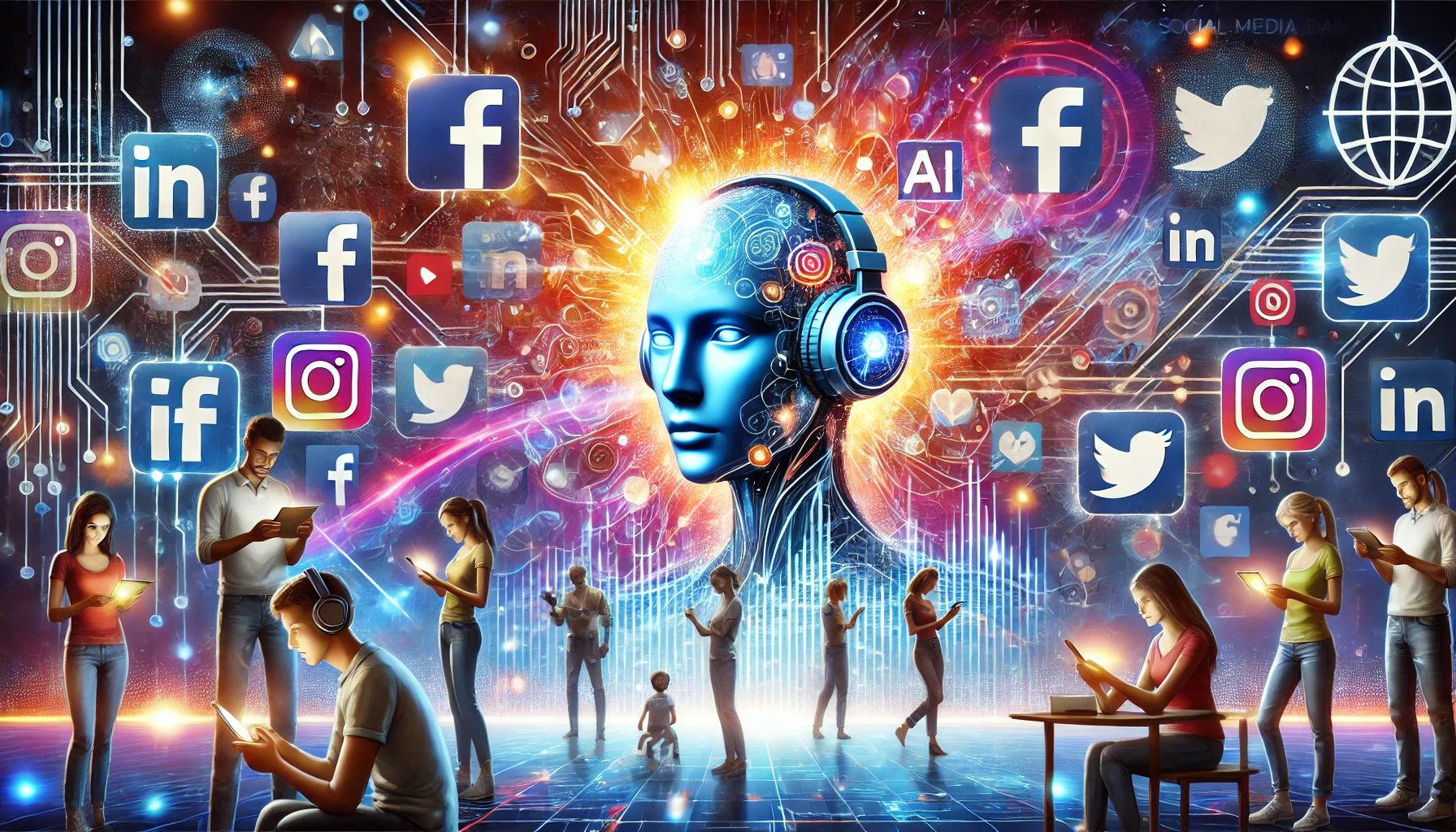The world of social media marketing is constantly evolving, with trends and technologies changing rapidly. From the rise of influencers to the explosion of video content, social media marketing has grown into an essential component of business strategy. But what does the future hold? What will social media marketing look like in 2030?
In this blog post, we’ll explore the key trends, emerging technologies, and shifts in consumer behavior that will shape social media marketing in the next decade.
1. The Rise of Augmented Reality (AR) and Virtual Reality (VR)
By 2030, it’s likely that augmented reality (AR) and virtual reality (VR) will be integral to the social media experience. Platforms like Facebook (Meta), Instagram, and Snapchat have already dipped their toes into the AR world with filters and interactive experiences. By 2030, this will go beyond simple filters and evolve into fully immersive brand experiences.
What to Expect:
- Immersive Shopping: Social media platforms will enable users to try products virtually before buying them, like trying on clothes or testing out makeup through AR or VR. E-commerce brands will be able to provide interactive, 3D product experiences that feel as real as in-store shopping.
- Virtual Events and Experiences: Brands could host fully immersive VR events where users can interact with products in a virtual environment. This could extend to live concerts, conferences, or product launches.
- Interactive Advertising: Expect ads that allow users to interact with the brand in virtual spaces, such as gamified experiences, 3D product demos, or interactive tutorials.
The seamless integration of AR and VR will allow brands to offer unique experiences that are both entertaining and engaging, transforming how we interact with products online.
2. AI-Powered Personalization
Artificial intelligence (AI) has already started revolutionizing social media marketing by offering personalized content, ads, and recommendations. By 2030, AI will become even more advanced, making personalization more precise and valuable than ever before.
What to Expect:
- Hyper-Personalized Content: Social media platforms will use advanced AI algorithms to deliver content that’s tailored to individual users’ preferences, behaviors, and even moods. This means that brands will be able to create highly targeted, personalized content that resonates with each user.
- AI Chatbots and Customer Service: AI-powered chatbots will take customer service on social media to the next level, providing faster, more accurate responses and handling more complex queries. These bots will be capable of understanding natural language and providing personalized assistance.
- Predictive Analytics: Brands will use AI to predict customer behavior, such as when they’re most likely to make a purchase or which products they might be interested in. This data will help brands create more effective campaigns and improve conversion rates.
As AI continues to improve, it will enable brands to create highly customized experiences that lead to better customer relationships and higher sales.
3. The Growth of Social Commerce
Social commerce—the integration of shopping features directly into social media platforms—is set to become a major force in the coming decade. As more users turn to social media to discover products, shop, and make purchases, social media platforms will increasingly double as online shopping malls.
What to Expect:
- In-App Purchases: Expect social media platforms like Instagram, TikTok, and Pinterest to make it even easier for users to purchase products directly from posts and ads. With features like shoppable posts, users will be able to check out without leaving the platform.
- Live Shopping Events: Live streaming and social shopping events will continue to grow in popularity, with influencers and brands hosting live events where products are sold in real-time. These events will become an essential part of e-commerce strategies, allowing brands to engage customers directly and drive instant sales.
- AI-Powered Product Recommendations: Social media platforms will use AI to suggest products based on users’ browsing habits, search history, and even the content they engage with. This will create a seamless shopping experience tailored to each individual.
As social commerce continues to evolve, it will blur the lines between entertainment and shopping, making it easier for users to discover and purchase products without ever leaving their favorite platforms.
4. Evolution of Video Content
Video content is already one of the most engaging types of content on social media, and by 2030, it will be an even more integral part of social media marketing. Platforms like YouTube, TikTok, and Instagram will continue to lead the way in video-based marketing, but new types of video content will emerge.
What to Expect:
- Interactive and Shoppable Videos: Video content will evolve to include interactive features like clickable hotspots and embedded links, allowing viewers to shop directly from videos. Imagine watching a tutorial or product demo and purchasing the featured items without ever leaving the video.
- Short-Form Video Dominance: The popularity of short-form video content like TikToks and Instagram Reels will continue to rise. Brands will need to get creative with their messaging, crafting engaging, bite-sized content that captures attention quickly.
- 360-Degree and 3D Video: Expect to see more 360-degree and 3D videos that provide immersive experiences. These videos will allow users to explore environments, products, or brand experiences in a much more engaging way.
Video content will not only entertain but also inform and engage customers in new, exciting ways, keeping brands at the forefront of digital storytelling.
5. The Importance of Privacy and Ethical Marketing
With growing concerns about privacy and data security, brands will need to be more transparent and ethical in their social media marketing strategies. By 2030, consumers will demand greater accountability from brands when it comes to how their data is used.
What to Expect:
- Stricter Data Regulations: Social media platforms will be subject to stricter data privacy regulations, requiring brands to be more careful about the data they collect and how it’s used. Brands will need to be transparent about their data collection practices and offer users more control over their information.
- Ethical Marketing: Ethical marketing will become more important as consumers become more aware of the impact of their purchasing decisions. Brands will need to align their marketing efforts with social responsibility and sustainability to build trust and loyalty.
- Trust-Building Strategies: Brands that prioritize transparency, data security, and ethical practices will build stronger relationships with their customers, fostering long-term loyalty.
Consumers will gravitate toward brands they can trust, and privacy will become a cornerstone of successful social media marketing strategies.
6. The Role of Social Media in Customer Service and Support
Social media will continue to be a key channel for customer service in 2030, with brands using it to provide quick and efficient support. However, the approach to customer service will become more sophisticated.
What to Expect:
- Real-Time, Automated Support: AI-driven chatbots and virtual assistants will provide real-time support on social media platforms, helping customers with inquiries, product recommendations, and order tracking instantly.
- Proactive Customer Service: Brands will proactively reach out to customers with personalized messages and support, addressing issues before they arise. This will create a more positive customer experience and prevent negative reviews or complaints.
- Voice and Visual Search Support: Voice assistants like Alexa and Google Assistant will become more integrated with social media platforms, allowing users to ask questions and get support through voice commands. Visual search, where customers can upload photos of products to search for similar items, will also become a standard feature.
By 2030, customer service on social media will be faster, more personalized, and available 24/7, giving brands a competitive edge in customer retention.
Conclusion: The Future of Social Media Marketing in 2030
As we look toward 2030, it’s clear that social media marketing will continue to evolve at a rapid pace. From AR and VR experiences to hyper-personalized AI content and the growth of social commerce, the next decade promises to bring significant changes that will reshape how brands connect with their audiences.
To stay ahead of the curve, brands will need to adapt quickly, embrace new technologies, and focus on building trust with their customers. The future of social media marketing is full of exciting possibilities, and those who embrace innovation will be well-positioned for success.






Leave feedback about this